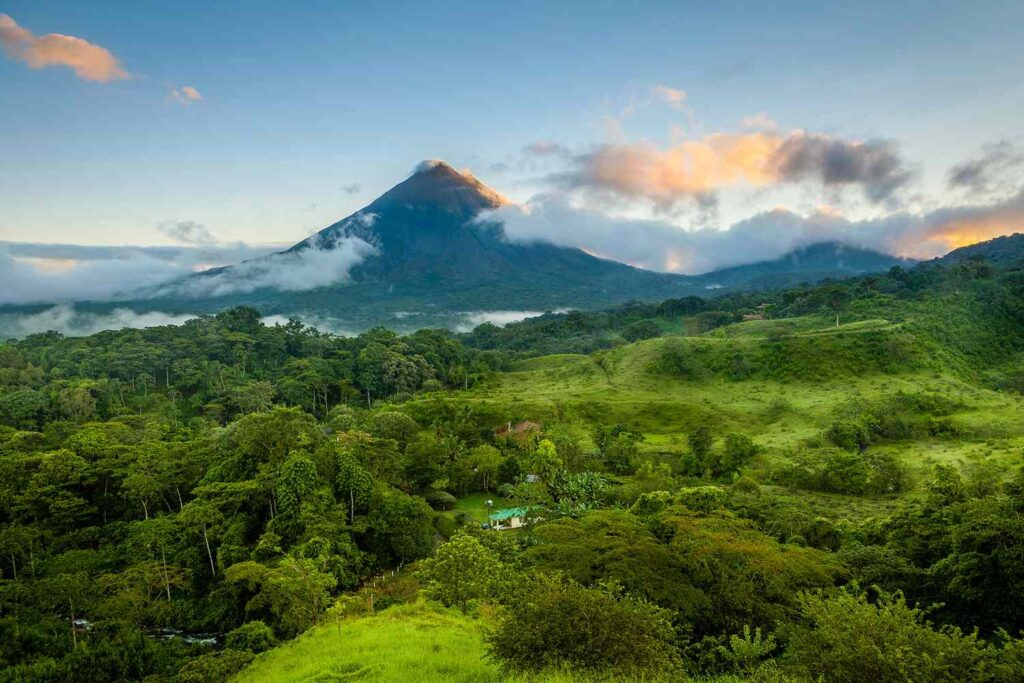Costa Rica Speciality Coffee
When it comes to coffee, Costa Rica takes their specialty coffee seriously. In fact, there are even laws regulating the growing, processing and distribution of specialty coffee beans (such as the ‘only arabica’ law and a requirement that enforces the harvest to be picked by hand). Because of this meticulous attention, Costa Rica boasts exceptional beans that are exported across the globe to specialty coffee lovers (such as ourselves).
Often consumers only see and experience Costa Rican coffee in its final form, as a cup of coffee. However, before the coffee beans make their way into your cup it’s been through an elaborate journey of growing, harvesting, processing and transporting that has been refined throughout decades and decades. In this blog, we take you back in time to the discovery of coffee in Costa Rica, through to the growth of competition across the bean belt, to today when Costa Rican coffee is enjoyed by the world. Get your thirst for adventure ready and uncover the beauty of this tropical paradise.
The history of specialty coffee in Costa Rica
Coffee plants were first brought to Costa Rica in 1779 from neighbouring Cuba. It wasn’t long before coffee farmers realised the potential of Costa Rica with its volcanic soils, fertile land, ideal climate and high altitudes. Coffee plants thrived. By 1820, Costa Rica coffee beans began to be exported across the globe.
Throughout the 1800’s Costa Rica’s coffee market saw rapid growth. From the UK, to the US – countries across the world were eager to brew Costa Rican coffee beans in their homes and cafes. The UK in particular invested heavily in the Costa Rican coffee industry, becoming the principal customer for exports until WWII. This increase in demand coupled with government incentives, played a big role in advancing Costa Rica’s coffee industry and the country as a whole.
The selling and exporting of Costa Rican coffee brought incredible modernisation to the country. Railroads were built, more roads were constructed and the capital San José became an exciting city centre (including the construction of the famous National Theatre – a product from the success of coffee farms).
The 1800s were an important century for Costa Rica. When the country gained independence from Spain in 1821 the new government was eager to boost Costa Rica’s economy, one cup of coffee at a time. The government invested heavily in the distribution of coffee seeds and coffee production by giving land to farmers (for free!) who wanted to cultivate coffee, which paid off incredibly. Coffee production was so successful, it was Costa Rica’s only export from the years starting from independence until 1890.
Specialty coffee competition for Costa Rica
While the 1800s was a century of growth and expansion for Costa Rica’s coffee industry, the 1900’s brought many obstacles and challenges. From the growth of competition, to the impacts of WWII rationing, environmental challenges and price fluctuations – Costa Rica was tried and tested.
Brazil, Honduras and Guatemala rose as strong competitors for Costa Rica, who were all making waves with their unique and delicious coffee beans. Brazil in particular was a big competitor, producing a whopping 40% of the world’s coffee by the mid 1800s. This gave Brazil control of the market, leading to price fluctuations that had major reverberations in Costa Rica.
By the late 1900s, world coffee prices plummeted by around 40% when the world quota cartel system collapsed. It took several decades for coffee to increase in value. This encouraged Costa Rica to join Honduras, Guatemala, Nicaragua and El Salvador to establish the Central American coffee retention plan that united the countries to achieve market stability.
The coffee industry was seen as so vital to the country’s economy that from 1950 all the way through to the 1970s, land was cleared for high-density planting. During this intensification, focus on conservation and sustainable development was heighted. Many laws were introduced to enforce farmers and citizens to uphold environmentally friendly behaviours. Whilst some were more successful than others, Costa Rica now holds a commendable international reputation as a successful and sustainable developing country.
Costa Rican specialty coffee in the 21st century
Costa Rica is a pivotal player in the world coffee market. Coffee exports account for nearly 20% of the country’s total exports, making up 1% of the world’s coffee production. Considering how small Costa Rica is, this is a mighty effort for a country only encompassing 51,100 square kilometres.
There are 50,000 individually owned coffee farms, 90% of which are on less than 13 acres of land. The largest growing areas are in the provinces of San José, Alajuela, Heredia, Puntarenas, and Cartago with the finest coffee plants grown at altitudes of 1200-1700 metres. The coffee is exported to other countries in the world and is also exported to cities in Costa Rica.
Costa Rican coffee is renowned by coffee connoisseurs with Tarrazú recognised as producing some of the best coffee beans in the world. Most famously, Starbucks sold specialty Costa Rican coffee from Tarrazú in their stores, marking it the most expensive coffee sold by Starbucks.The coffee was prepared and served in a French Press.
It’s time for a cup of Costa Rica
Coffee is more than a delicious beverage in Costa Rica. The growing, producing and exporting of coffee changed the country forever, providing jobs and income to citizens, boosting the economy in its entirety and shaping the culture of the Central American country.
Now that you’ve made it to the end of this blog, we invite you to order a bag of Costa Rican beans (just ask our team when our next roast will be!) and enjoy your brew how the Costa Ricans would, as a filter!





